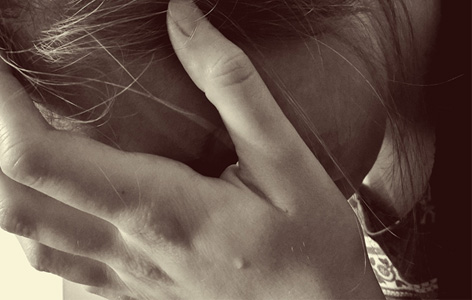Home page Description:
Caregivers of ICU survivors are at high risk of developing emotional distress and depression.
Posted On: August 17, 2016

Image Caption:
Caregivers of patients often experience poor health-related quality of life and symptoms of post-traumatic stress disorder.
A new study shows that certain caregivers are at a high risk of developing clinical depression. Specifically, caregivers of intensive care unit (ICU) survivors that received mechanical ventilation for a minimum of seven days are at risk of depression; and the risk to caregivers persists for up to one year after the ICU survivors are discharged. The study, led by TRI Affiliate Scientist Dr. Jill Cameron, highlights the need to consider the mental health of caregivers in post-ICU care.
From 2007-2014, caregivers of patients who received seven or more days of mechanical ventilation in an ICU across 10 Canadian hospitals were given self-administered questionnaires to assess caregiver and patient characteristics, caregiver depression symptoms, psychological well-being, health-related quality of life, sense of control over life and impact of providing care on other activities. Assessments occurred seven days and three, six and 12-months after ICU discharge.
The study found that most caregivers reported high levels of depression symptoms, which commonly persisted up to one year and did not improve in some. Caregivers experienced better health outcomes when they were older, caring for a spouse, had higher income, better social support, sense of control, and when caregiving had less of a negative impact on their everyday lives.
Interestingly, the study revealed that some patient characteristics, such as illness severity and psychological well-being, did not affect how depressed the caregivers were.
"We need to intervene and support caregivers of all patients, not just the 'sickest' patients. Caregivers are not a uniform body of individuals—they have different needs unique to their caregiving situation," says Dr. Cameron.
The next phase of this research will focus on developing a program for caregivers to better prepare them for their role, including education and information on community-based resources, access to home care, and how they can draw on social and psychological support.
This work was supported by the Canadian Institutes of Health Research, the Ontario Academic Health Science Centre and Ministry of Health Innovation Fund, the University of Toronto Department of Medicine Integration Challenge Fund, and the Toronto General & Western Hospital Foundation. M Cypel is a Tier 2 Canada Research Chair in Lung Transplantation.
One-year outcomes in caregivers of critically ill patients. Cameron JI, Chu LM, Matte A, Tomlinson G, Chan L, Thomas C, Friedrich JO, Mehta S, Lamontagne F, Levasseur M, Ferguson ND, Adhikari NK, Rudkowski JC, Meggison H, Skrobik Y, Flannery J, Bayley M, Batt J, dos Santos C, Abbey SE, Tan A, Lo V, Mathur S, Parotto M, Morris D, Flockhart L, Fan E, Lee CM, Wilcox ME, Ayas N, Choong K, Fowler R, Scales DC, Sinuff T, Cuthbertson BH, Rose L, Robles P, Burns S, Cypel M, Singer L, Chaparro C, Chow CW, Keshavjee S, Brochard L, Hébert P, Slutsky AS, Marshall JC, Cook D, Herridge MS; RECOVER Program Investigators (Phase 1: towards RECOVER); Canadian Critical Care Trials Group. New England Journal of Medicine. doi:10.1056/NEJMoa1511160. 2016 May. [Pubmed abstract]
From 2007-2014, caregivers of patients who received seven or more days of mechanical ventilation in an ICU across 10 Canadian hospitals were given self-administered questionnaires to assess caregiver and patient characteristics, caregiver depression symptoms, psychological well-being, health-related quality of life, sense of control over life and impact of providing care on other activities. Assessments occurred seven days and three, six and 12-months after ICU discharge.
The study found that most caregivers reported high levels of depression symptoms, which commonly persisted up to one year and did not improve in some. Caregivers experienced better health outcomes when they were older, caring for a spouse, had higher income, better social support, sense of control, and when caregiving had less of a negative impact on their everyday lives.
Interestingly, the study revealed that some patient characteristics, such as illness severity and psychological well-being, did not affect how depressed the caregivers were.
"We need to intervene and support caregivers of all patients, not just the 'sickest' patients. Caregivers are not a uniform body of individuals—they have different needs unique to their caregiving situation," says Dr. Cameron.
The next phase of this research will focus on developing a program for caregivers to better prepare them for their role, including education and information on community-based resources, access to home care, and how they can draw on social and psychological support.
This work was supported by the Canadian Institutes of Health Research, the Ontario Academic Health Science Centre and Ministry of Health Innovation Fund, the University of Toronto Department of Medicine Integration Challenge Fund, and the Toronto General & Western Hospital Foundation. M Cypel is a Tier 2 Canada Research Chair in Lung Transplantation.
One-year outcomes in caregivers of critically ill patients. Cameron JI, Chu LM, Matte A, Tomlinson G, Chan L, Thomas C, Friedrich JO, Mehta S, Lamontagne F, Levasseur M, Ferguson ND, Adhikari NK, Rudkowski JC, Meggison H, Skrobik Y, Flannery J, Bayley M, Batt J, dos Santos C, Abbey SE, Tan A, Lo V, Mathur S, Parotto M, Morris D, Flockhart L, Fan E, Lee CM, Wilcox ME, Ayas N, Choong K, Fowler R, Scales DC, Sinuff T, Cuthbertson BH, Rose L, Robles P, Burns S, Cypel M, Singer L, Chaparro C, Chow CW, Keshavjee S, Brochard L, Hébert P, Slutsky AS, Marshall JC, Cook D, Herridge MS; RECOVER Program Investigators (Phase 1: towards RECOVER); Canadian Critical Care Trials Group. New England Journal of Medicine. doi:10.1056/NEJMoa1511160. 2016 May. [Pubmed abstract]




